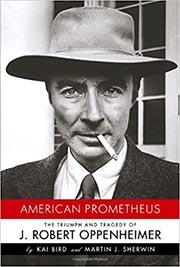American Prometheus: The Triumph and Tragedy of J. Robert Oppenheimer
by Kai Bird and Martin Sherwin
Reviewed April 19, 2005
 Most will recognize J. Robert Oppenheimer as the scientific leader of the Manhattan Project and the "father" of the atomic bomb. However, few know about his life before this critical point in history. Authors Martin Sherwin and Kai Bird have teamed together to write one of the most comprehensive biographies on this American icon. Twenty-five years of research is reflected on every one of the 736 pages.
Most will recognize J. Robert Oppenheimer as the scientific leader of the Manhattan Project and the "father" of the atomic bomb. However, few know about his life before this critical point in history. Authors Martin Sherwin and Kai Bird have teamed together to write one of the most comprehensive biographies on this American icon. Twenty-five years of research is reflected on every one of the 736 pages.
American Prometheus provides a rich and compelling account of Oppenheimer's life. We are given a solid understanding of his childhood living on Manhattan's Upper West Side and the influence of attending New York City's Ethical Culture School. Oppenheimer's genius began to shine even at this early age. But some of the cracks in his psyche are also exposed. Oppenheimer does not reflect the popular image of a magnetic personality and leader of the race to build the atomic bomb.
Sherwin and Bird paint a portrait of a troubled young man, and recount the troubles he encountered at Harvard and Cambridge. This sketch of Oppenheimer begins to change texture and shape as he begins to find his inner fire. Upon returning to America, the magnetic enigma of "Oppy" begins to emerge and continues to grow while teaching at Berkeley and Cal Tech.
The book provides a basic account of the development of the atomic bomb, and like other recent biographies on Oppenheimer, does not dwell on this stage of his life. However, the authors do provide a detailed examination of Oppenheimer's left wing influences and the repercussions in his later life.
Like the legendary Prometheus who stole fire from the gods and was punished, Sherwin and Bird chronicle the events that cause this American one to fall. As Oppenheimer's career chased the atom's inner fire and its control, this quest was not without costs. Oppy's brisk personality, coupled with his left-wing past, provided the catalyst for his fall. During the hysteria of the McCarthy-era, Oppenheimer became a prime target. These events culminated in the review of his security clearance by the Atomic Energy Commission. The authors reveal the shameful actions undertaken by Oppenheimer's enemies and present a convincing portrayal of the events inside the "kangaroo-court".
After his fall from grace, Oppenheimer retreated to being the Director of the Institute of Advanced Study at Princeton. Although he received some redemption, when he was awarded the Enrico Fermi award, Oppenheimer never recovered. Oppenheimer retired from Princeton in 1966 and died of throat cancer on February 18, 1967. Bird and Sherwin have written a rich, detailed, and enjoyable biography of one of the great scientists of the 20th century. Available at amazon.com